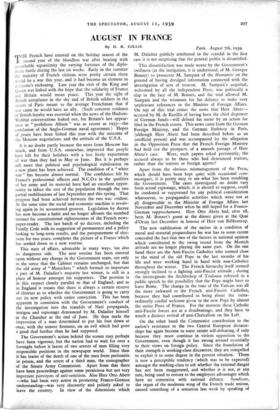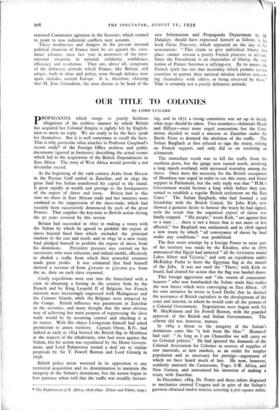AUGUST IN FRANCE
By D. R. GILLIE
Park. August 7th, 1939.
/11HE French have entered on the holiday season of the second year of the bloodless war after bearing with remarkable equanimity the varying fortunes of the diplo- matic battle during the last six weeks. Early in the summer the majority of French citizens were pretty certain there would be a war this year, and it had become an element in everyone's reckoning. Last year the visit of the King and Queen was linked with the hope that the solidarity of France and Britain would mean peace. This year the sight of British aeroplanes in the sky and of British soldiers in the streets of Paris meant to the average Frenchman that if war came he would have an ally. (Such concrete evidence of British loyalty was essential when the news of the Hudson- IX'ohltat conversations leaked out, for Britain's last appear- ance as "perfidious Albion" was as recent as 1935—the conclusion of the Anglo-German naval agreement.) Hopes of peace have been linked this year with the outcome of the Moscow negotiations and the attitude of the U.S.A.
It is no doubt partly because the news from Moscow has much, and from U.S.A. somewhat, improved that people have left for their holidays with a less lively expectation of war than they had in May or June. But it is perhaps still more that political and psychological stabilisation on a new plane has been achieved. The condition of a "white war" has become almost normal. The confidence felt by France's professional officers and N.C.O.s in the qualities of her army and its material have had an excellent oppor- tunity to infect the rest of the population through the two partial mobilisations of last September and this spring. That progress had been achieved between the two was evident. At the same time the social and economic machine is revolv- ing again in its accustomed grooves. Legislation by decree has now become a habit and no longer affronts the numbed instinct foL constitutional righteousness of the French news- paper-reader. The last batch of 90 decrees, including the Family Code with its suggestion of permanence and a policy looking to long-term results, and the postponement of elec- tions for two years, completes the picture of a France which has settled down to a new routine.
This state of affairs, admirable in many ways, has also its dangerous side. The new routine has been entered upon without any change in the Government team, not only in the sense that the Cabinet remains unchanged, but that the old army of " Munichois " which formed so important a part of M. Daladier's majority last winter, is still in a place of honour amongst his supporters. The position is in this respect closely parallel to that of England, and as in England it means that there is always a certain reserve of distrust as to whether the Government is going to carry out its new policy with entire conviction. This has been apparent in connexion with the Government's conduct of the investigation into the scandals of Nazi propaganda, intrigue and espionage denounced by M. Daladier himself in the Chamber at the end of June. He then made the impression of a man determined to put his foot down at once, with the utmost firmness, on an evil which had gone a good deal further than he had supposed.
The Government's action behind the scenes may perhaps have been vigorous, but the nation had to wait for over a fortnight before it learnt of two arrests of men filling very responsible positions in the newspaper world. Since then it has learnt of the death of one of the men from peritonitis in prison, and the arrest of a third man, the stenographer of the Senate Army Commission. Apart from that there have been proceedings against some pernicious but not very important purveyors of anti-semitism. Also Herr Otto Abetz —who had been very active in promoting Franco-German understanding—was very discreetly and politely asked to leave the country. In view of the dimensions which M. Daladier publicly attributed to the scandal in the first case it is not surprising that the general public is dissatisfied.
This dissatisfaction was made worse by the Government's swiftness (at the instigation, it is understood, of M. Georges Bonnet) to 'prosecute M. Sampaix of the Hurnanite on the ground of having divulged information connected with the investigation of acts of treason. M. Sampaix's acquittal, welcomed by all the independent Press, was politically a slap in the face of M. Bonnet, and the trial allowed M. Sampaix and the witnesses for his defence to make very unpleasant references to the Minister of Foreign Affairs. On top of this trial comes the news that Herr Abetz- accused by M. de Kerillis of having been the chief dispenser of German funds—will defend his name by an action for libel in the French courts. This news came from the German Foreign Ministry, and the German Embassy in Paris, (although Herr Abetz had been described before as an unofficial person) and was accompanied by the allegation in the Opposition Press that the French Foreign Ministry had held out the prospects of a smooth passage of Herr Abetz's case. Were, such papers asked pertinently, the accused always to be those who had denounced traitors, rather than the traitors or foreign agents?
Apart from the obvious mismanagement of the Press, which should have been kept quiet with occasional com- muniques, it is pretty easy to see what has been troubling the Government. The cases investigated no doubt vary from actual espionage, which, it is absurd to suppose, could be condoned or suppressed for any political consideration whatsoever, to propagandist activities which were not at all disagreeable to the Minister of Foreign Affairs last November and December when he still hoped for a Franco- German rapprochement. Herr Otto Abetz had, after all, been M. Bonnet's guest at the dinner given at the Quai d'Orsay last December in honour of Herr von Ribbentrop.
The new stabilisation of the nation in a condition of moral and material preparedness for war has to some extent concealed the fact that two of the factors in national opinion which contributed to the swing round from the Munich attitude are no longer playing the same part. On the one hand there are the Anti-Fascist Catholics who seemed close to the mind of the old Pope in the last months of his life and were working hand in hand with non-Catholics throughout the winter. The French hierarchy itself seemed strongly inclined to a fighting anti-Fascist attitude ; during the interregnum the Archbishop of Toulouse referred in a public speech to the possibility that the Pope might have to leave Rome. The change in the tone of the Vatican was all the more awkward to the French anti-Fascist Catholics, because they had contributed to bring about the extra- ordinarily cordial welcome given to the new Pope by almost the entire Press of France. For the moment these Catholic anti-Fascist forces are at a disadvantage, and they have to watch a distinct revival of anti-Clericalism on the Left.
On the other hand the Communist contribution to the nation's resistance to the two Central European dictator- ships has again become to some extent self-defeating, if only because they must continue in violent opposition to the Government, even though it has swung around essentially to their views on foreign policy. Since the foundation of their strength is working-class discontent, they are compelled to exploit it to some degree in the present situation. There is now a perceptible tendency (which was to be expected) amongst the working-class to ask whether the external danger has not been exaggerated, and whether it is not, at any rate, being used to restore to the employers advantages which have no connexion with national defence. Syndicats, the organ of the moderate wing of the French trade unions, caused something of a sensation last week by speaking of renewed Communist agitation in the factories, which seemed to point to new industrial conflicts next autumn. These weaknesses and dangers in the present internal political situation of France must be set against the enor- mous advance since last year in awareness of the inter- national situation, in national solidarity, confidence, efficiency and resolution. They are, above all, symptoms of the defensive attitude which France, like Britain, still adopts, both in ideas and policy, even though defence now again includes eastern Europe. It is, therefore, cheering that M. Jean Giraudoux, the man chosen to be head of the new Information and Propaganda Department by M. Daladier, should have expressed himself as follows in his book Pleins Pouvoirs, which appeared on the day of his nomination: "This claim to give individual liberty first place cannot remain a purely French pleasure or attitude. Since the Frenchman is an imperialist of liberty, the very nation of France becomes a rallying-cry. By its nature the French spirit has not that neutrality which permits certain countries to pursue their national mission without concern- ing themselves with others, or being observed by them." That is certainly not a purely defensive attitude.









































 Previous page
Previous page